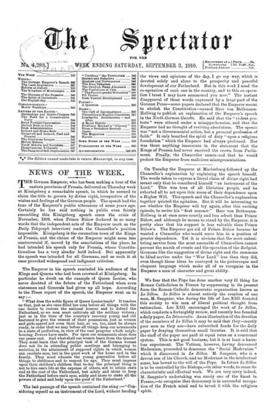On Tuesday the Emperor at Marienburg followed up the Chancellor's
explanation by explaining the speech himself. The words taken to express a literal claim of divine right bad meant only that he considered himself "an instrument of the Lord." This was true of all Christian people, and he exhorted all to act upon this sense of their dependence upon a Higher Will. This speech and the Chancellor's explanation together quieted the agitation. But it will be interesting to see whether the Emperor will try again, after this exciting episode, to revive his "first manner." Herr von Bethmann- Hollweg is at once more courtly and less adroit than Prince Billow, and although he means to stand by the Emperor, it is pretty clear that his support is less valuable than- Prince Billow's. The Emperor got rid of Prince Billow because he wanted a Chancellor who would serve him in a position of greater dependence. Yet it is obvious that the most unhesi- tating service from the most amenable of Chancellors cannot prevent the march of events and the operation of the Zeitgeist. Germans like the suggestion of divine right and the summons to blind service under the "War Lord" less than they did, even though those ideas be conveyed in the picturesque and eloquent language which make all of us recognise in the Emperor a man of character and great ability.










































